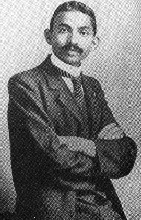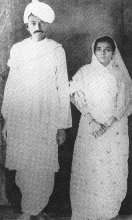National Icon
Gandhi
One part man,nine parts soul
The stroke of midnight on the 15th of August 1947 was a historic moment for the people of the country for at that moment, India was born. Prior to independence, India was but an amalgamation of princely states, often at war with each other, vying for supremacy and power. The East India Company, after a foray into the area, set up camp at Masulipanam and Surat and then, little by little, proceeded to claim complete dominion over what is now India and Pakistan. The turning point in this imposition of British colonial rule was the Battle of Buxar which was fought in October 1764 through which the British obtained the Diwani Rights (or the right to collect revenue) of Bengal which at that time comprised the Indian states of West Bengal, Orissa, Bihar, Jharkhand, Uttar Pradesh , as well as of Bangladesh. This, in due time, led to total British dominion over present day India and Pakistan, a dominion that was to last 190 years.
moment, India was born. Prior to independence, India was but an amalgamation of princely states, often at war with each other, vying for supremacy and power. The East India Company, after a foray into the area, set up camp at Masulipanam and Surat and then, little by little, proceeded to claim complete dominion over what is now India and Pakistan. The turning point in this imposition of British colonial rule was the Battle of Buxar which was fought in October 1764 through which the British obtained the Diwani Rights (or the right to collect revenue) of Bengal which at that time comprised the Indian states of West Bengal, Orissa, Bihar, Jharkhand, Uttar Pradesh , as well as of Bangladesh. This, in due time, led to total British dominion over present day India and Pakistan, a dominion that was to last 190 years.
After the 15th of August 1947, for the first time, the people of so many creeds and cultures were united under the Indian tri – colour. Years of strife and struggle had led to the attainment of a goal for which countless lives were sacrificed; such was this cause’s calling. Innumerable people willingly gave their lives for what we take for granted today; our freedom.
 Now, 63 years down the line, India is an emerging super power with rapid development occurring in all spheres. Had it not been for the great martyrs of the struggle for independence, would we be where we are today? It is indeed sad that in today’s day and age, most have forgotten these great leaders; they have been relegated to the pages of history and obscure books. Many know of them but few know about them.
Now, 63 years down the line, India is an emerging super power with rapid development occurring in all spheres. Had it not been for the great martyrs of the struggle for independence, would we be where we are today? It is indeed sad that in today’s day and age, most have forgotten these great leaders; they have been relegated to the pages of history and obscure books. Many know of them but few know about them.
Though there were innumerable Indian national leaders who were instrumental in the quest for Indian independence, none can measure up to the man who has become an enigma, both nationally and internationally. Mohandas Karamchand Gandhi was born on the 2nd of October 1869 at the coastal town of Porbandar in the Kathiawar region west of present day Mumbai. For five generations or more, Mohandas’ forebears had served Kathiawar’s princes as administrators. Uttamchand or Ota Gandh, Mohandas’ grandfather, was the most successful among them. The ruler of Porbandar made him a diwan or first minister of his territories, and Ota Gandhi, who enhanced the state’s irrigation and revenues, obtained for his master a Class One status from the British who kept a watchful eye on princely states such as Porbandar. Two of Ota’s sons – Karamchand, Mohandas’ father, and his younger brother Tulsidas – also became diwans of Porbandar.
His mother Putlibai, keeping with the rigid caste system of the times forbade her children to touch people belonging to the Shudra or untouchable caste. She told them that if such a travesty occurred, it can be cured by touching a Muslim. Her At the age of twelve, he had an epiphany which was brought about by a play he saw which narrated the tale of Harishchandra who clung to the truth even when all his loved ones, and he himself, suffered greatly as a result. Later on in life he says, “At the time that communal unity possessed me, I was a lad of twelve years old.”
In 1882, before Mohandas was fully thirteen, he was married to Kastur Makanji Kapadia, a Porbandar girl who  was a few months older than he was. His wedding was bunched up with another two for economical purposes. An older Gandhi would later on blame his father for his ‘child marriage’ which cost him a year of school. Eventually, he finished his matriculation exam in June 1890 and thereby gaining a sense of accomplishment, he spent a four week holiday in Brighton, England. His being in the midst of British society resulted in a brief period of Gandhi’s westernization but he eventually came to his senses and re – embraced his Indian customs and ways.
was a few months older than he was. His wedding was bunched up with another two for economical purposes. An older Gandhi would later on blame his father for his ‘child marriage’ which cost him a year of school. Eventually, he finished his matriculation exam in June 1890 and thereby gaining a sense of accomplishment, he spent a four week holiday in Brighton, England. His being in the midst of British society resulted in a brief period of Gandhi’s westernization but he eventually came to his senses and re – embraced his Indian customs and ways.
Mahatma Gandhi as he later came to be known as was a great man, an enigma of sorts and his principal ideal in life were truth. He was an irresistible force in the struggle for independence and perhaps this was because of his methods in achieving this goal. At a time when India was overrun by violence and hatered he advocated peace and non – violence. He came up with the Satyagraha movement whose guiding force was truth. Satyagraha is a synthesis of the Sanskrit words Satya (truth) and Agraha (holding firmly to). For Gandhi, satyagraha went far beyond mere “passive resistance” and became strength in practicing non-violent methods. In his words:
“Truth (satya) implies love, and firmness (agraha) engenders and therefore serves as a synonym for force. I thus began to call the Indian movement Satyagraha, that is to say, the Force which is born of Truth and Love or non-violence, and gave up the use of the phrase “passive resistance”, in connection with it, so much so that even in English writing we often avoided it and used instead the word “satyagraha”.
A staunch vegetarian, Gandhi saw that Britain’s vegetarians had given him new life. Through them he found friendship, a field of activity and a platform for writing and speaking. They also linked him to politics. Through his vegetarianism, he met Dr. Josiah Oldfield, six years his senior and the two got along famously. Oldfield later went on to become the editor of The Vegetarian published by the London Vegetarian Society. It was through The Vegetarian that he also met Alfred Hills, a wealthy industrialist who provided much of the funding for the publication. It was Hills who convinced Mohandas to write for The Vegetarian. It was in the nine articles that he wrote for the journal and in talks and interviews he gave in 1891 to vegetarian groups that we begin to see the political and philosophical side of Mahatma Gandhi.
In his article entitled ‘Indian Vegetarians’, he says, ‘one of the most greatly – felt evils of the British rule is the importation of alcohol – that enemy of mankind, that curse of civilisation’, and takes care to point out that both Hindus and Muslims are unhappy that ‘the Government, it seems, instead of stopping, are aiding and abetting the spread of alcohol’. If the vegetarian movement gave him opportunities to make political points, he also felt confident enough to assert, on the basis of ‘my personal experience’, that ‘English vegetarians will more readily sympathise with the Indian aspirations’ and indeed that ‘the vegetarian movement will indirectly aid India politically also…’
While in England, Gandhi read the Gita both in Sanskrit and its English translation The Song Celestrial by Edwin Arnold. He later came to know of Arnold’s other book on the Buddha, The Light of Asia, which Mohandas read with even greater interest. At the suggestion of a Christian from Manchester whom Gandhi had met in a vegetarian boarding house, he also read the Bible. He found the Old Testament heavy going, especially the book of Genesis, but the Sermon on the Mount in the New Testament went straight to his heart. Some at least of his prejudice against Christianity evaporated in London. The Christians he was meeting seemed likeable, and he attended church services a number of times. He took something with him from the sermons. He said that Congregationalist Joseph Parker, whose noontime sermons on Thursdays he went to hear many times, helped him in his rejection of atheism. Part of the London Gandhi, independent and curious, was clearly looking for the right religion to follow. Though not his central pursuit in London, this was a question on his mind. He is reported to have said that he was a Hindu by birth but unclear about where he stood and what he believed and that he was keen to make a careful study of Hinduism and other religions. His close friend Michael Coates, whom he met in Pretoria, had once asked him why a rational man like Gandhi wore a necklace of Tulsi beads and if Gandhi believed if the necklace had any spiritual powers. When Gandhi said that he did not believe that it did, Coates asked him if he would break it. Gandhi then went on to say that he would not as the necklace was a sacred gift from his mother and was ‘put around my neck out of love’.
This clearly shows Gandhi’s questioning bent of mind as it does his open mindedness. He was willing to take in new ideas, analyse them and, following his chief ideal in life which was truth. His witty responses and philosophical train of thought was very unexpected for the British who looked at Indians as intellectual inferiors. Gandhi, being the man that he was, shattered this pre – conceived notion and paved the way to India attaining a level foothold with its one time rulers.
EP Desk


